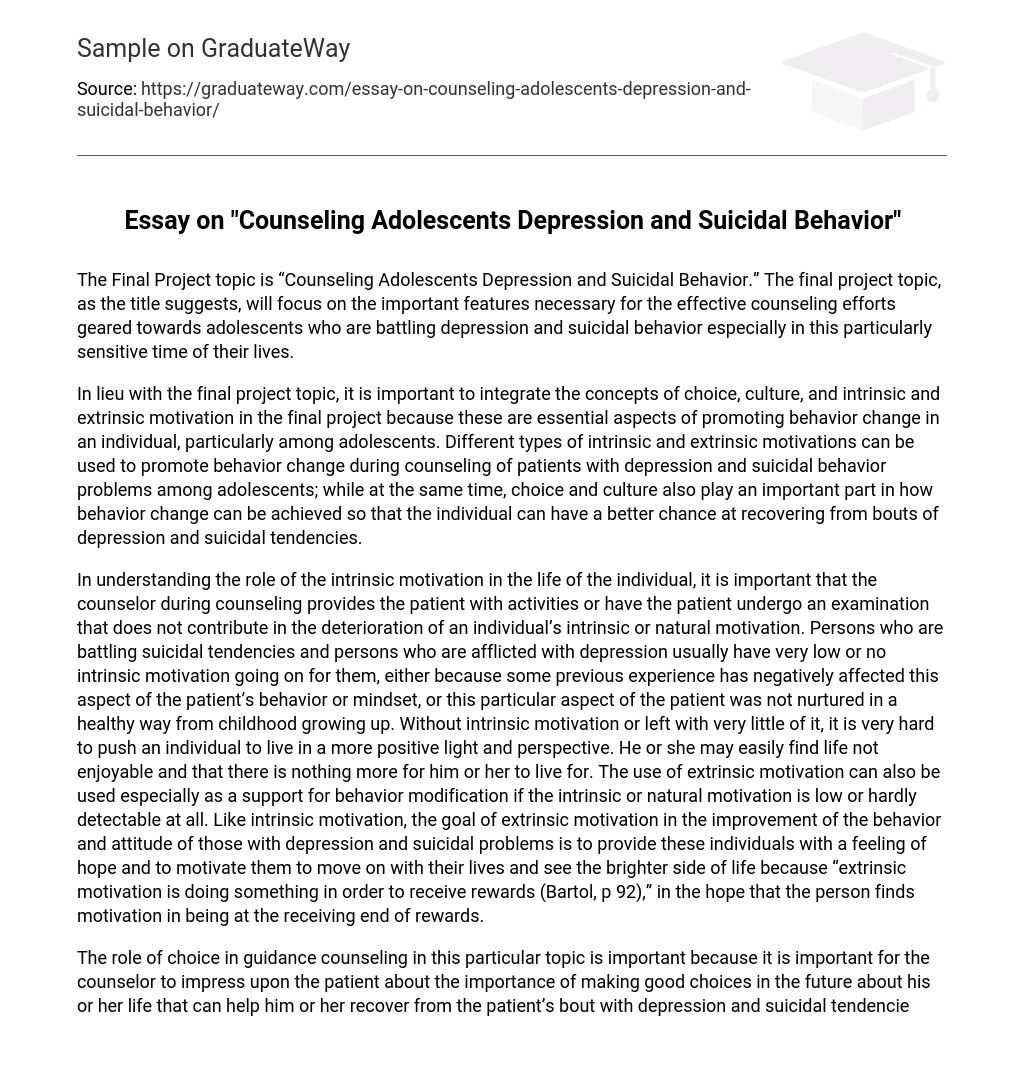The Final Project topic is “Counseling Adolescents Depression and Suicidal Behavior.” The final project topic, as the title suggests, will focus on the important features necessary for the effective counseling efforts geared towards adolescents who are battling depression and suicidal behavior especially in this particularly sensitive time of their lives.
In lieu with the final project topic, it is important to integrate the concepts of choice, culture, and intrinsic and extrinsic motivation in the final project because these are essential aspects of promoting behavior change in an individual, particularly among adolescents. Different types of intrinsic and extrinsic motivations can be used to promote behavior change during counseling of patients with depression and suicidal behavior problems among adolescents; while at the same time, choice and culture also play an important part in how behavior change can be achieved so that the individual can have a better chance at recovering from bouts of depression and suicidal tendencies.
In understanding the role of the intrinsic motivation in the life of the individual, it is important that the counselor during counseling provides the patient with activities or have the patient undergo an examination that does not contribute in the deterioration of an individual’s intrinsic or natural motivation. Persons who are battling suicidal tendencies and persons who are afflicted with depression usually have very low or no intrinsic motivation going on for them, either because some previous experience has negatively affected this aspect of the patient’s behavior or mindset, or this particular aspect of the patient was not nurtured in a healthy way from childhood growing up. Without intrinsic motivation or left with very little of it, it is very hard to push an individual to live in a more positive light and perspective. He or she may easily find life not enjoyable and that there is nothing more for him or her to live for. The use of extrinsic motivation can also be used especially as a support for behavior modification if the intrinsic or natural motivation is low or hardly detectable at all. Like intrinsic motivation, the goal of extrinsic motivation in the improvement of the behavior and attitude of those with depression and suicidal problems is to provide these individuals with a feeling of hope and to motivate them to move on with their lives and see the brighter side of life because “extrinsic motivation is doing something in order to receive rewards (Bartol, p 92),” in the hope that the person finds motivation in being at the receiving end of rewards.
The role of choice in guidance counseling in this particular topic is important because it is important for the counselor to impress upon the patient about the importance of making good choices in the future about his or her life that can help him or her recover from the patient’s bout with depression and suicidal tendencies. At the same time, it is important for the guidance counselor to know that in the effort for behavior improvement and modification. It is important that the counselor also guides the patient towards the ideal action when faced with making choices. In the case that the guidance counselor is effectively influencing the actions of the patient, he or she may mimic the choice or selection pattern of the guidance counselor and make choices for himself/herself that can help the patient recover from suicidal tendencies and depression and not experience regression.
Culture is an important aspect of the effort for behavior modification because culture heavily influences an individual, his/her mental set-up, his/her outlook, his/her psychological disposition as well as his/her emotional structure. In the effort for behavior improvement, modification and development, the counselor should take into consideration the fact that the patient with suicidal tendencies and depression problems will not get well when immersed in an environment that is characterized by an existing culture that leads towards this kind of feeling. The counselor should guide the individual towards being involved in a culture that brings out the best side of the individual and leaves little or no room at all, for the chance that the individual may detect signs or signals in the culture he or she is in that can push or her back to her previous psychological health problem and worsen her case of suicidal tendencies and depression.
Reference
Bartol, C. R. (March 2008). Current Perspectives in Forensic Psychology and Criminal
Behavior. SAGE Publications.





